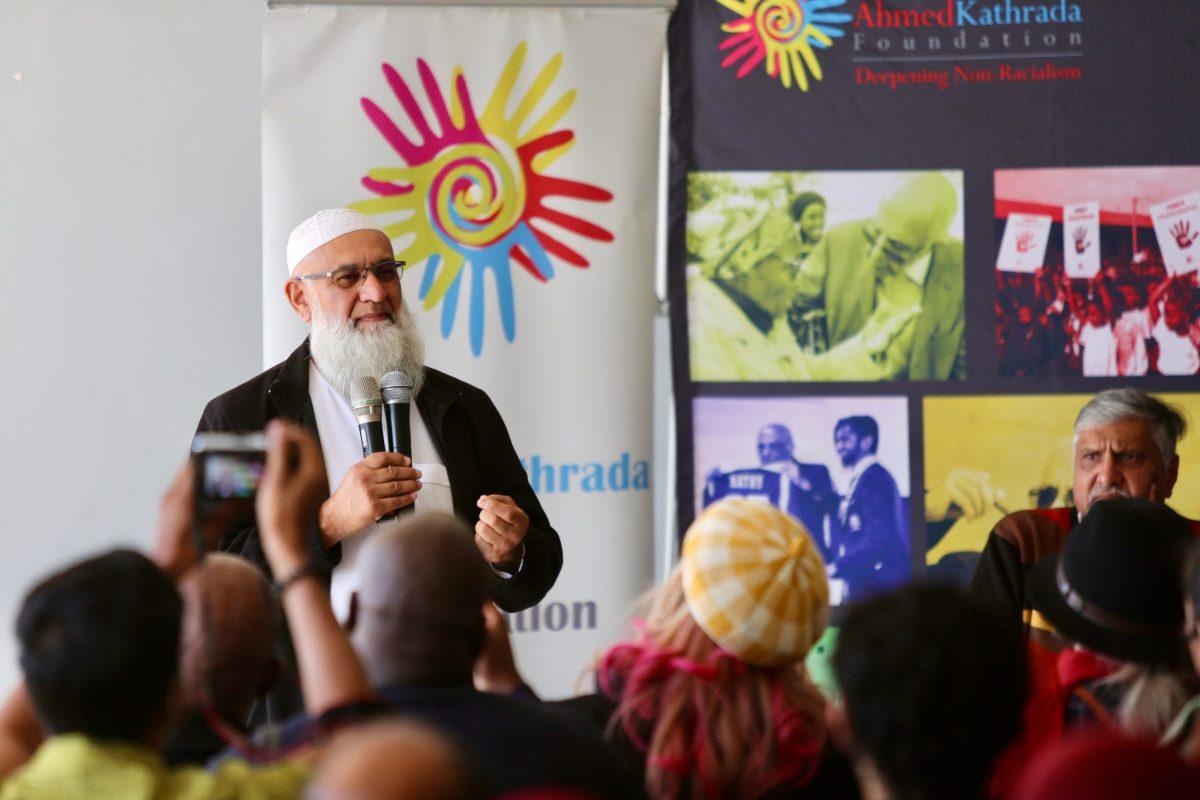Lenasia, South Africa — On the 40th anniversary of the formation of the Lenasia Youth League (LYL), the Ahmed Kathrada Foundation held a book launch to bring together apartheid-era youth activists to celebrate them and their work.
The book, “Young Lions of Lenz: Lenasia Youth League (1982 – 1991),” is written by long-time Lenasia resident Ismail Vadi, a former member of parliament for the African National Congress (ANC).
Lenasia, or Lenz, was created by the apartheid government under the Group Areas Act of 1950 when Black and brown South Africans were forcibly removed from areas reserved for white South Africans. Designated as Indian and located just south of Johannesburg, Lenz has been a hub for anti-apartheid activists for many decades.
Vadi told The Hawk at the June 5 launch that while he wrote the historical context of the LYL and pieced together the timeline of events, the book mainly tells the story through a compilation of LYL members’ voices and stories. Other anti-apartheid youth groups also operated in Lenasia during this period in the 70s and 80s, fighting in the struggle against apartheid.
“I’ve asked members of the Youth League to write up short reflections of their experiences so their voices emerge and their insight,” Vadi said. “Today’s the launch of the book, but it is a very special moment because, for the first time, all of us have come together in this format.”
The LYL, which was formed in June 1982, lasted until 1991 when the ANC was unbanned in South Africa. The LYL then dissolved and became part of the ANC Youth League, Vadi explained.
Anti-apartheid stalwart, Premanathan “Prema” Naidoo, attended the launch. Naidoo, a founding member of the LYL, was arrested on Nov. 27, 1981, by agents of the apartheid government for his political activism.
“I was being interrogated at security headquarters, and I was tortured for seven days and seven nights, continually kept naked and abused, because I was in the underground,” Naidoo said.
Intimidation and violence aimed toward youth activists was common. Reyhana Satar, a member of the LYL beginning in the late 80s, said the police would park in front of homes and turn on their headlights at night to terrorize known activists. Satar, who spoke at the book launch about what it was like to grow up during that era, said she got involved in activism through her older siblings.
“It was part of your upbringing to protest against the kind of life that you were living daily,” Satar said.
Satar said she continues to encourage activism in the youth of today by leading by example and “taking up space.”

“I brought my kids [to the book launch] specifically because they weren’t part of this,” Satar said. “We will always be imbued with a sense of purpose. We are deeply committed South Africans, and for me, it’s important to carry that message on to our children that you have to contribute.”
Vadi and Naidoo are both board members for the Kathrada Foundation, which hosted the book launch. The Foundation’s primary goal is to continue the legacy of the struggle against apartheid in present-day South Africa, which includes working with young people to get them actively involved in civic life.
Zarina Motala attended the book launch and currently works for the Kathrada Foundation as a community facilitator with the Accountability Lab for the Lenasia area, a collective of local organizations across nine countries that work to hold local governments and non-governmental organizations accountable in their communities.

Motala said the book launch was important for the community because it serves as an opportunity not only to celebrate the stories of youth activists and organizers of the past but also to remind current youth about how to effectively take part in civil society at any level.
“This is why today is extremely important to get youth to organize in the spaces you occupy,” Motala said. “You are the future, but you’re the now as well.”
The Kathrada Foundation focuses especially on non-racialism, a political ideology in South Africa that rejects racism and racialism. Naidoo said he grew up in a family that was rooted in the “tradition of non-racialism and non-sexism,” and they fought for those ideals. Naidoo’s brother, Indres Naidoo, was arrested, tortured and held on Robben Island for 10 years because of his own activism.
“Non-racialism is something that young people must get involved in, in whatever form or shape they feel is necessary, but it is the youth who will bring about the changes,” Naidoo said.
Irfaan Mangera, youth activism program manager for the Kathrada Foundation, said influential activists from the 70s and 80s who were present at the book launch differ from present youth. The older activists had a clear-cut goal to fight against: bringing an end to the apartheid system, Mangera said.
Now, Mangera said, youth activists are faced with numerous large issues to tackle, including racism, gender-based violence, climate change, mental health, quality/access to education and unemployment.
“This is why, as the foundation and particularly the youth program in the last year to two years, has shifted our focus away from that isolation on one issue,” Mangera said. “That’s why we then took the intersectional approach, so that we recognize all of these issues. But we need to start building a broader-based movement of young people to create a system that starts listening to those demands.”
Vadi said while current youth activists can draw inspiration from past movements, they should be ready to define and fight the challenges of today.
“You guys have to step in and shape your own destinies and determine your own issues. And don’t wait. I’m telling you, history is not going to wait for you. You have to shape history,” Vadi said.














































